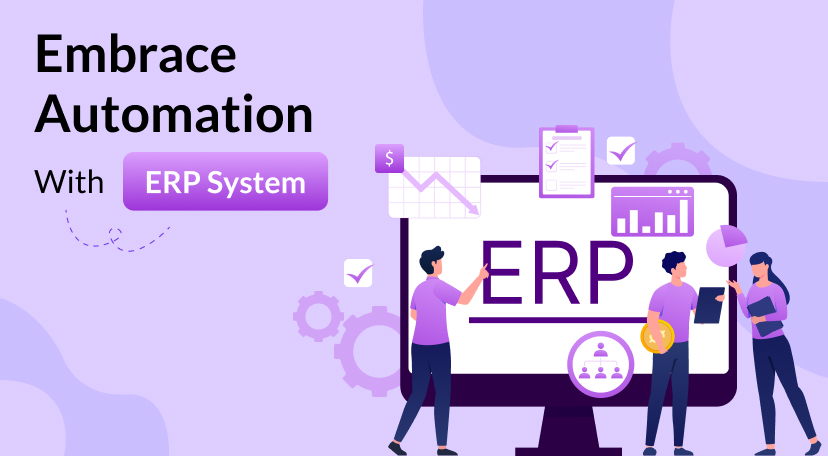What is an ERP system?

An Enterprise Resource Planner or ERP system is a full-featured software to combine and simplify several business operations. For the purpose of managing key operations like finance, HR management, purchasing, manufacturing, supply, CRM, etc. it acts as a central hub.
Fundamentally, an ERP system unifies information from several departments into a single database, facilitating improved decision-making throughout the company and offering real-time insight.
ERP increases operational efficiency, saves costs, decreases mistakes, and boosts productivity by automating repetitive operations, standardizing procedures, and enabling smooth departmental communication.
ERP usually has modules or components designed for certain business tasks, enabling companies to modify the software to meet their own requirements.
How does ERP help in automating operations?
- Streamlined Procedures: By offering a consolidated program for managing operations, ERP solutions standardize and simplify corporate processes. Furthermore, it minimizes mistakes and increases productivity by automating repetitive processes. For example, data input, reporting, and workflow management. Thus, it decreases the need for manual intervention.
- Integrated data: ERP integrates data from all the departments and roles into a single database. Furthermore, it guarantees accuracy and consistency. Through seamless departmental communication and collaboration made possible by this solution, operations run more smoothly, and decision happens more quickly.
- Automated Workflows: By establishing rules and prompts for particular actions and activities, ERP makes it possible to automate workflows. Furthermore, an ER system can start creating purchase orders automatically when inventory levels drop below a predetermined point or start creating invoices when a sales order is finished. Additionally, ERP software speeds up cycle time, lowers manual labor, and increases productivity by automating these processes.
- Real-time Insights: ERP systems give businesses rapid access to important business KPIs and performance indicators. It helps in enabling them to measure progress, keep an eye on activities, and quickly pinpoint areas that need improvement. Furthermore, decision-makers are empowered to act swiftly and strategically by having access to current data and analytics, which promotes operational efficiency.
- Resource Optimization: ERP systems assist businesses in making more efficient use of their resources, such as labor, materials, and time, by automating repetitive tasks and streamlining operations. Thus, it helps businesses maximize resource usage, cut waste, and improve overall efficiency—whether it is by scheduling manufacturing operations, controlling inventory levels, or allocating human resources.
What to keep in mind while choosing ERP system?
- Begin by identifying your organization’s specific requirements & objectives. Consider factors such as the size of your business, industry-specific needs, functional requirements, scalability, and growth projections.
- Furthermore, look for an ERP that offers customization options to tailor your unique workflow. Ensure that the system is flexible and can adhere to future changes.
- Choose a solution that is intuitive and user-friendly, as this will facilitate adoption and training among employees, leading to faster implementation and higher productivity.
One such ERP system example is Alian Hub. It is a comprehensive solution for managing your business operations. You may run your business without using multiple applications once you subscribe to Alian Hub. Project management, IT, HR management, engineering, time tracking, administrative support, sales, and marketing, and user action monitoring are all the features offered by this ERP.
Another example is Bamboo HR for recruitment businesses. It can manage payroll, onboard new employees, and keep an eye on applications. Its main characteristics include the automation of HR processes such as candidate selection, onboarding, and recruitment.
Conclusion
In conclusion, in today’s fast-paced corporate world, embracing automation with an ERP system is not only an option but a need. By automating repetitive procedures, integrating data, and delivering real-time insights, enterprise resource planning (ERP) solutions enable firms to improve efficiency, accelerate growth, and simplify operations. Businesses may make better decisions, adjust to shifting market dynamics, and seize new chances for success and innovation by utilizing ERP’s revolutionary potential.
FAQs
How does ERP software ensure data security and compliance?
Can ERP be customized to fit specific industry needs?
How long does it take to implement an ERP?
What kind of ongoing support is available for ERP system users?
Can ERP integrate with other third-party applications?
Ravi Bhojani is the Chief Marketing Officer (CMO) at Alian Software, where he spearheads the company’s marketing strategies and drives its brand presence in the competitive IT services landscape. With over a decade of experience in the technology and marketing sectors, Ravi has consistently demonstrated his ability to blend innovative marketing techniques with deep industry knowledge to deliver outstanding results.